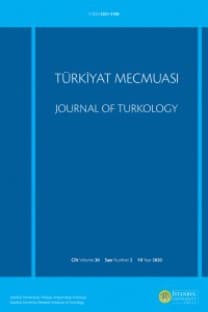HÂKİMİYET-İ MİLLİYE GAZETESİNE GÖRE CUMHURİYETİN İLK YILLARINDA TÜRKİYE-BULGARİSTAN İLİŞKİLERİ (1923-1930)
Bu çalışmada 1923-1930 yılları arasında Türkiye Cumhuriyeti ile Bulgaristan arasındaki ilişkilerin kamuoyuna yansıyan boyutları Hâkimiyet-i Milliye gazetesi üzerinden ve arşiv belgelerine de referansla değerlendirilmektedir. I. Dünya Savaşı’ndan yenik çıkan Bulgaristan’da Milli Mücadele’ye duyulan sempati iki ülke arasındaki iyi ilişkilere zemin hazırlamıştır. Bulgar Çiftçi Partisi’nin bir askerî darbe ile iktidardan düşürülmesi sonrasında iktidara gelen radikal milliyetçilerin söylem ve siyasetleri şüphe ile karşılansa da karşılıklı güvensizlik aşılabilmiş ve iki ülke arasında 1925’te bir “Dostluk Antlaşması” imzalanabilmiştir. Antlaşmaya rağmen iki devlet ve iki halk arasında yakın geçmişin hadiselerinden kaynaklanan sorunlar zaman zaman kendisini göstermiştir. 1929’da iki ülke arasında “Tarafsızlık, Uzlaşma, Adli Tesviye ve Tahkim Antlaşması” yapılmıştır. Ne var ki 1920’lerin sonuna gelirken Türkiye’nin uluslararası siyasetini statükodan yana belirlemesi, ayrıca Bulgaristan İtalya ile birlikte revizyonist bloğa yaklaşırken Türkiye’nin Bulgaristan ile uzlaşmaz menfaatleri bulunan diğer Balkan devletleri ile yakınlaşma stratejisi ilişkilerde bozulmaya neden olmuştur. Türkiye ve Bulgaristan arasındaki siyasi ve diplomatik ilişkilerin doğası ekonomik, toplumsal ve kültürel ilişkileri de etkilemiştir. Kamuoyu algısını hem üreten hem de yansıtan ve yayan bir kaynak olarak basın iki ülke arasındaki ilişkileri anlamak adına detaylı veriler sağlamaktadır
Anahtar Kelimeler:
Türkiye Cumhuriyeti, Bulgaristan, diplomatik ilişkiler
TURKISH – BULGARIAN RELATIONS IN THE EARLY REPUBLICAN ERA ACCORDING TO THE HÂKİMİYET-İ MİLLİYE NEWSPAPER (1923-1930)
In this study, the reflections of the relations between the Republic of Turkey and Bulgaria between the years of 1923-1930 are evaluated from the Hakimiyet-i Milliye newspaper also with reference to archive documents. The symphaty towards the Turkish National Struggle in Bulgaria which was defeated in the World War I, has paved the way for better relations between the two countries. Although the radical nationalists’ rhetoric and policies have been met with suspect in Turkey after the military coup that overthrown the Bulgarian Farmer’s Party from the power, it was succeeded in overcoming the mutual distrust and a “Treaty of Friendship” was signed between two countries in 1925. Despite the agreement, the problems arising from the recent past events between the two states and two societies occasionally showed themselves. “Treaty of Neutrality, Conciliation, Judicial Settlement and Arbitration” was signed between the two states in 1929. However, coming to the end of 1920s, Turkey’s determination of its international politics in favor of the status quo and while Bulgaria was approaching to the revisionist bloc with Italy, Turkey’s rapprochement strategy with the other Balkan states whose interests are irreconcilable with the interests of Bulgaria, caused a deterioration in relations. The nature of the political and diplomatic relations between Turkey and Bulgaria also affected economic, social and cultural relations. The press, which is producing and also reflecting and emitting public perception, provides detailed data to understand the relationship between the two countries
- Başlangıç: 1925
- Yayıncı: İstanbul Üniversitesi Türkiyat Araştırmaları Enstitüsü
Sayıdaki Diğer Makaleler
HZ. MUHAMMED’İN MUHTASAR ŞEMÂİL-İ ŞERİF TERCÜMESİ'İNDE GEÇEN VASIFLARI
DIMAŞK SELÇUKLU MELİKİ ERTAŞ BİN TUTUŞ
İSTANBUL ÜNİVERSİTESİ TÜRKİYAT ARAŞTIRMALARI ENSTİTÜSÜ’NDEKİ EL YAZMALARININ KATALOGU
TÜRK MENŞELİ BAZI ÇİN AİLELERİ: HUN, LI, JİN VE YUWEN
GİRİT’TE YETİM OLMAK: MUHTARİYET İDARESİ VE AKRABA MECLİSLERİ (1898-1913)
LEV NİKOLAYEVİÇ GUMİLËV VE ETNOGENEZ TEORİSİ
MAHDUMKULU ŞİİRİNİN ÇOK SEVİLİP YAYILMASININ SEBEPLERİ ÜZERİNE
EVLİYA ÇELEBİ'YE GÖRE II. VİYANA MUHASARASINDA KIRIM HANI'NIN YANLIŞ TUTUMUNUN SEBEPLERİ
EVLİYA ÇELEBİ’YE GÖRE II. VİYANA MUHASARASINDA KIRIM HANI’NIN YANLIŞ TUTUMUNUN SEBEPLERİ
